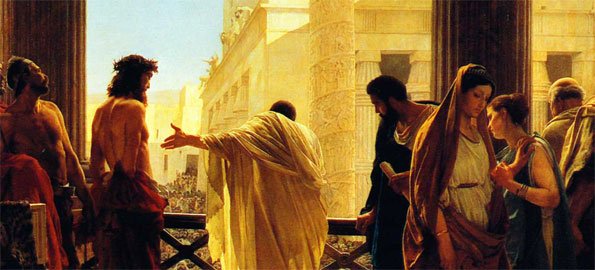
The idea that government is good and necessary is an assumed truth by most Christians, and perhaps by most of the world. This idea is hardly ever argued and thus most Christians have never tried to defend it using Scripture. That’s why I want to tackle this subject. I hope to challenge the perceptions that many Christians hold and also offer some knowledge to other Christian anarchists who may be wondering how their faith interacts with politics.
If you want to start at the beginning of my series, read:
Can a Christian Be an Anarchist? (Part 1)
All Christians Should Be Socialists (Christian Anarchy - Part 2)
Christian Perceptions of Government

In my experience, there’s a strong consensus among Evangelical Christians that Democracy is the best form of government God has given to us. Among my American Evangelical friends there’s an even stronger belief that America and the United States government (or at least the Constitution) is God’s greatest gift to mankind.
The more things change the more they stay the same…
It wasn’t so long ago that the Divine Right of Kings was considered a core facet of Christianity.
Christians Cannot Be Entirely Anarchistic
While I have moved far beyond the views of my brethren from the past who bowed before kings, and my brothers and sisters today who pay homage to the state, I cannot fully embrace the label “anarchist.”
Let me explain: I do identify as an anarchist because I do not believe any man has the right to rule over anyone else, nor can he gain that right through birth, decree or vote.
Horizontally, I am an anarchist.
But I do have a King. Kingship belongs to the Lord (Psalm 22:28).
Vertically, I am a monarchist.
Jesus is King. All Christians must see him as their ruler and monarch. In this way Christians are not anarchists, we are monarchists. But there is a big difference between a supreme being having authority over the things he created and men who were created equal to other men claiming the authority to rule over each other.
What Does the Bible Actually Say About Human Government?

Let’s take a look at a few texts beginning with what I would submit is the most important portion of Scripture ever written on the subject of Government.
Wishing to be like the other nations of the world, the people of Israel demanded a king.
6 But the thing displeased Samuel when they said, “Give us a king to judge us.” And Samuel prayed to the Lord. 7 And the Lord said to Samuel, “Obey the voice of the people in all that they say to you, for they have not rejected you, but they have rejected me from being king over them. 8 According to all the deeds that they have done, from the day I brought them up out of Egypt even to this day, forsaking me and serving other gods, so they are also doing to you. 9 Now then, obey their voice; only you shall solemnly warn them and show them the ways of the king who shall reign over them.”
10 So Samuel told all the words of the Lord to the people who were asking for a king from him. 11 He said, “These will be the ways of the king who will reign over you: he will take your sons and appoint them to his chariots and to be his horsemen and to run before his chariots. 12 And he will appoint for himself commanders of thousands and commanders of fifties, and some to plow his ground and to reap his harvest, and to make his implements of war and the equipment of his chariots. 13 He will take your daughters to be perfumers and cooks and bakers. 14 He will take the best of your fields and vineyards and olive orchards and give them to his servants. 15 He will take the tenth of your grain and of your vineyards and give it to his officers and to his servants. 16 He will take your male servants and female servants and the best of your young men[a] and your donkeys, and put them to his work. 17 He will take the tenth of your flocks, and you shall be his slaves. 18 And in that day you will cry out because of your king, whom you have chosen for yourselves, but the Lord will not answer you in that day.”
1 Samuel 8:6-22 (ESV)
Bear in mind that the nation of Israel was a very unique thing in the Bible for reasons that will be discussed in a later article in this series. But I see no reason to believe that what God says here through Samuel is only applicable to Israel. And it’s pretty clear: Those who demand a ruler have turned their back on the one true king – God Almighty.
Not only is this a moral warning, it’s pragmatic as well. God warns that a king will:
1. Force the nation’s sons into military duty and other “services”
2. Take their daughters and put them to work
3. Steal the best land, crops and resources for himself and his servants
4. Demand a portion of all the nation’s labour and resources (taxes)
He ends with a grave warning that they will cry out to God for relief from their earthly king, but God will not listen. He will leave them at the mercy of the very thing they asked for – a master.
Here’s another important verse.
Jesus answered, “My kingdom is not of this world. If my kingdom were of this world, my servants would have been fighting, that I might not be delivered over to the Jews. But my kingdom is not from the world.”
John 18:36 (ESV)
This saying from Jesus is not inherently anarchistic, but it does at least suggest that Christians ought not concern themselves with attempting to advance the Kingdom of Heaven through politics. This message seems to be lost on the many, many Christians who wish to legislate all Biblical morality by placing legal limits on marriage and criminalizing vice just to name a couple examples.
But what about this verse?! And what about that verse?!! I hear your protests, and don’t worry. I’ll be getting to those tricky passages soon enough.
Thanks for reading, and be sure to read tomorrow’s article “Render Unto Caesar That Which is Caesar’s.”
If you like this series, follow me @sethlinson.

It's funny how I have heard preachers talk about how it was wrong for them to ask for a king. I never even gave it a second thought until I became an anarchist. Then I read it again and was shocked. I have heard someone say that the Constitution was inspired by God but that doesn't make sense at all to me because that makes it the same as the Bible.
Interesting you should bring that up. An official doctrine of the Church of the Latter Day Saints (Mormons) is that the US Constitution is a divinely inspired document.
Now as for other churches... they may not hold to that as a matter of doctrine, but the way I hear some Christians talk about America and the Constitution... Let's just say I wouldn't be surprised if that's what they believe too.
The constitution was divinely inspired. (Not word for word like the Book of Mormon). It’s the divine mechanism for the restoration of Christ’s Church and Holy Proesthood (LDS Church). Without codified freedom of religion the church could not have been restored. Also the Constitution is a return to a system of Judges like in Early Israel, rather than an Earthly monarchy which is a rejection of Christ as King. The Early Republic didnt replace Christ but the Modern one has..... imho.
Since it seems like we're operating from entirely different premises about what is/isn't true revelation from God, I don't imagine we'll get far in this conversation.
I promise I'll get around to looking at your other replies as soon as I can. Things have been busy with the holidays afoot. Thanks for actually taking the time to read my articles!
Perhaps "Theochist", or "Thearchist", would work?
Looking forward to tomorrow's. It's an incredibly abused verse.
Very good point. This passage detailing the people of Israel's desire for a king seems to me to be the foundational verse for the Christian anarchist argument. It establishes God's original intention for his people, to be governed by his law, not by man. In Christ, the law is written on the heart, which I believe is the prerequisite to anarchists ever getting their wish of a utopian society. The heart must be changed.
Which brings us to the ultimate reason man is unqualified to rule over other men and why God has the right to be king: man is at the core sinful and selfish and therefore authority has a corrupting influence; God is perfectly benevolent and can be trusted to rule, always with humanity's best interests in mind. Besides, as you said, he is the creator, which alone makes him worthy.